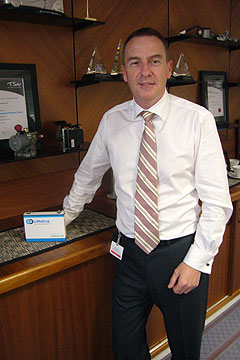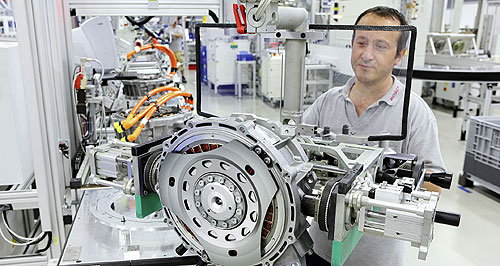Make / Model Search
News - General NewsBosch looks offshore to remain viable in AustraliaElectric focus: Bosch Australia is heavily involved in EV Engineering's Commodore project, with the first prototypes now on the road. Car parts giant Bosch drawn to EVs as local industry woes put it in holding pattern9 Dec 2011 By IAN PORTER THE giant Robert Bosch car parts group will not be investing any more in its Australian manufacturing operations until there is a significant lift in production by the three local car-makers Ford, Holden and Toyota. Robert Bosch Australia president Gavin Smith said he was confident all three local manufacturers had developed the right products to spur an increase in sales, but said there would have to be a substantial increase in production before any new parts would be added to Bosch’s local plants. Earlier this year Bosch announced it would move some manufacturing operations offshore and reduce staff by 380 people over the next two years. “I’d say the challenge at the moment is about the size of the domestic car industry,” he told GoAuto in an exclusive interview. “Whilst we are producing in the low-200,000s a year, being able to attract the investment needed to produce the very complex parts that we, as a supplier, design and develop, the domestic market is too small in isolation. “So you’d need to see substantially more cars being built as a base to allow you to develop a manufacturing case compared to importation from somewhere else. That remains a challenge,” he said. Local car production has not been so low since 1957. But it would be wrong to assume Bosch was winding down its Australian operations. Indeed, Mr Smith said he expected the job loses to be recouped over the next decade, restoring employee numbers to around the 1800 mark. In the same timeframe, Bosch Australia expects to double its revenues across the whole company, not just the automotive parts operations. Barring any sudden recovery in production volumes by the local car-makers, the growth in automotive operations could be some way off as it is expected to be recorded in the electric vehicle (EV) area, including batteries, charging infrastructure and even in some clever software which may become an industry standard.  Left: Robert Bosch Australia president Gavin Smith. Left: Robert Bosch Australia president Gavin Smith.“The future of mobility, for us, is the EV. And what the company has chosen to do is take a strength – systems and components for the internal combustion engine – and build within that the competence and capability that relates to EVs,” he said. Thus, as one part of the division declines, the other will expand. What is shrinking at the moment is the sector that makes electronic stability control and associated hardware, although the 80-strong engineering capability is retained. Similarly, production of body computers that run the dome lights, electric door locks, automatic seat adjustment and similar components will be shipped offshore, although the 90 or so engineers will remain. The manufacturing that continues will be the Bosch group’s world centre for the production of power diodes – more than 100 million a year – and sundry engine parts, like the air/fuel module on the top of the Holden V6 and fuel rails for Ford. The company's wholly owned subsidiary Pacifica makes disc brakes (rotors and callipers) and suspension parts, and that business continues, although it has suffered as local car volumes have dropped. However, as its local automotive parts manufacturing is shrinking, Bosch is using its engineers to expand its offshore engineering work with car-makers across Asia. About 40 per cent of the work now done by the 80 local chassis systems engineers is for offshore clients, Mr Smith said. Much of this work is to do with ESC and traction control systems, and anti-lock braking systems (ABS). “We are doing work for Chinese manufacturers, we are also doing work for Proton in Malaysia, we are also doing work for Mahindra and Mahindra in India,” Mr Smith said. “We have done work on an ABS system for Harley Davidson in the US, and we have a project coming up for Honda in Japan. “So, of those 80 engineers, less than 60 per cent of them are doing work for the local vehicle manufacturers, and the other 40 per cent are doing work for overseas customers.” This offshore work had given Bosch a great opportunity to develop skills in engineering for EVs, something it could not do by relying on the three local manufacturers. The need to learn about EV design was one reason why Bosch was a foundation member of the EV Engineering (EVE) project, which is developing an electric version of the Commodore in a $26 million project in Port Melbourne. “I have to say this is one of the most amazing projects I have seen in my career to date,” said Mr Smith, who is also a director of EVE. “Last week, I drove that car. It’s a full electric, and it’s one of the best cars I have driven. Not the best electric car, one of the best cars I have driven,” Mr Smith said. The EVE cars – seven will be made by mid-2012 – will use batteries from a Bosch/Samsung factory in Korea. A high proportion of Bosch’s engineering operations concern the development of ESC systems and the EVE project has been a challenge because the usual vacuum and signals input from internal combustion engines are not found in an EV. Mr Smith said the decision by Bosch head office that electric vehicles were the future in the automotive sector had led the company to think about all aspects of EVs. One of the bright ideas the international Bosch group has come up with is a software system that allows interoperability between different electric vehicle recharging networks. “The software allows the drivers of EVs to use any charge station anywhere regardless of who the network operator might be.” The software will sit across the top of the network operators and allows the billing to be routed back to your account, no matter whose infrastructure was used for the recharge. Mr Smith said the industry had to be open to interoperability to guard against undermining people’s confidence in the early stages of EV adoption.  Read more5th of December 2011  Bosch wants annual inspectionsLocal parts-maker cites safety concerns as it lobbies government in Canberra31st of October 2011  BMW batteries for electric CommodoreHolden Commodore EV prototypes to employ the same battery tech as BMW’s i3 and i818th of July 2011  EVs not a ‘silver bullet’ for sustainabilitySAE-A calls for more tech in local engines and holistic approach to electrification18th of April 2011  Daimler and Bosch team up on EV motorsNew Daimler-Bosch EV battery joint venture to welcome sales to other car-makers25th of March 2011  Bosch cuts Australian manufacturing380 jobs to go as Bosch Australia shifts manufacturing operations to Asia and Europe |
Click to shareGeneral News articlesResearch General News Motor industry news |











Facebook Twitter Instagram